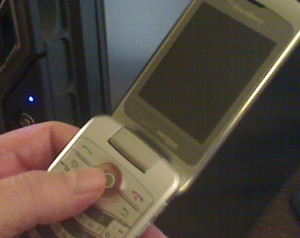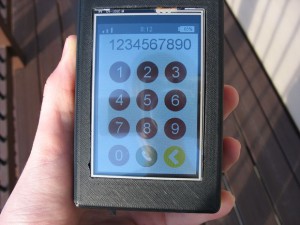 I do have a smartphone, a clamshell, Blackberry 8230. It was my first mobile phone and I bought it somewhere towards the end of Obama’s first term, around 2010. I got it because it was cheap and I was afraid I’d break it or lose it. Mostly I’ve used it as a 3G tether for my laptops while on the bus to and from work. I was never an early adopter. Before and during that time, it seemed like the entire world slid into the touch screen.
I do have a smartphone, a clamshell, Blackberry 8230. It was my first mobile phone and I bought it somewhere towards the end of Obama’s first term, around 2010. I got it because it was cheap and I was afraid I’d break it or lose it. Mostly I’ve used it as a 3G tether for my laptops while on the bus to and from work. I was never an early adopter. Before and during that time, it seemed like the entire world slid into the touch screen.
One of the objections I have to smartphones, even Android using hardware, is that they aren’t modular like desktop computers. Yes, I’ve read about Project Ara but, since 2011, it seems like almost no one has adopted that form factor yet and, there are various legal and business entanglements that are slowing progress. Because of this, in the last 4 years, I’ve been reading about DIY projects with open, commodity hardware to build smart phones: 
- First I found an attempt at running Android on the now suspiciously abandoned looking Flow DIY hardware set.
- Then I read about David Hunt, who built a smartphone out of a Raspberry Pi. This was really more of an experiment, not to be enclosed and held together with plastic zip ties.
- About a year later, I read about Tyler Spadgenske’s much more polished and enclosed attempt with a newer model of Raspberry Pi.
Raspberry Pis get more and more feature packed with each iteration and have now diversified into different models for different applications. Given that, Spadgenske’s DIY smartphone looks to me like the street is going to find its own solutions to this tinkerer’s urge before Project Ara will.
I’m sorely tempted to try my own hand at this, just for bragging rights.

I hope you do buy a raspberry pi and start tinkering. I have two of them and I wish I had more time to play with them.
but you miss the point with regard to smart phones… these devices are hand held computers… and just like desktops, and laptops, the functionality is primarily driven by the availability of good software. Sorry, but the aesthetic of the OS is secondary. The non-modularity of the hardware is what it is. The utility is in the availability of the software: the apps. So then there are two flavors to choose from: Android, or Apple. I choose android: a) because I am not willing to drink the apple cool-aid. b) because the android apps are portable across a variety of smart phone manufacturers (I like samsung). I have a lot of really useful apps: better camera software, mapping/gps software, calculators, unit converters, levels, astronomical tools, tide/wave/temp data from the NOAA, swim meet data to see how my daughter and her team-mates are doing, bird identification, various clocks, monitoring tools for my home network, and a nice dice roller… etc etc.
yes you can build a ras-pi phone: you will get a phone and portable internet access, you can buy a separate gps chip: but you will have to write your own software to link the GPS on the phone to google maps; You can add a camara module to the ras-pi, but you will need to write some software to use it; basically there is no large repository of linux software focused on portable devices: no app store man!
and from a cost point of view by the time you buy the ras-pi ($30), figure out power management, buy a camera unit ($30), by the cell phone antenna/sim-card (?), print a case for the project, etc etc. you are probably really close to a $140 entry level samsung (we have 3 of these phones in the family and they are great).
– JW
Sure, I’m missing the point but, this is an ideological issue for me.
Android has forked enormously since its introduction back in 2006. It forks each time a new phone maker decides it doesn’t want to release specific driver and firmware information to the community–which is a bit like how Apple and Microsoft do it, right? So there’s an Android for Samsung, an Android for LG, an Android for Motorola–HTC, Sony, Nokia, etc. etc. This means that Android doesn’t really update across all phones equally and if your phone is decided by the OEM to be “too old” or “no longer supported,” you gotta junk it–again, kinda like Apple or Microsoft, right?
There have been people in the open source community that have warning about the dangers of closed proprietary drivers infecting Linux code for over ten years now:
http://lkml.iu.edu/hypermail/linux/kernel/0512.0/0972.html
http://geekz.co.uk/lovesraymond/archive/linux-doomsday
Your touting all these wonderful applications in your Samsung phone being “mostly” portable across all Android phones is a bit like the last panel of the cartoon in that second link. The position I’m trying to take here is more Stallman-like. It’s gotta be open everywhere. Open hardware, open software and zero proprietary binary anywhere. Otherwise stuff like this happens:
http://gizmodo.com/android-nerds-are-freaking-out-over-rumors-that-google-1762473172
Your position does have a lot of weight behind it–lots of convenience, no app store, less hardware (like GPS or Bluetooth) and most important–no cost savings.
But ideological hairsplitting aside, bragging rights dude! Bragging rights!
.